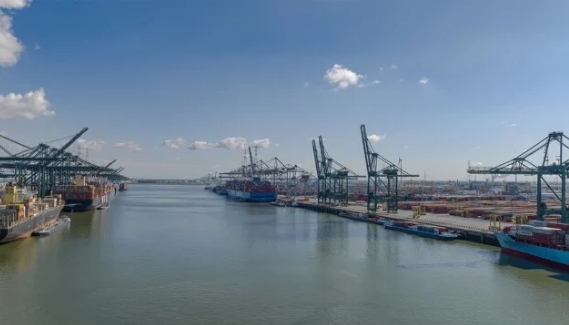
Antwerp was Europe's busiest container port in Q1 but is waiting to seethe impact of U.S. tariffs
Antwerp-Bruges processed 3,436,000 TEUs in Q1 2025, reflecting a 4.6 percent increase in container tonnage and a 4.5 percent rise in TEUs. In contrast, Rotterdam, long Europe’s leading port, handled 3,364,000 TEUs, with a modest 2.2 percent TEU growth. Despite the container success, Antwerp-Bruges saw a 4 percent overall cargo decline, totaling 67.7 million tonnes, primarily due to a 19.1 percent drop in liquid cargo, including gasoline, naphtha, and LNG. Rotterdam reported a 5.8 percent overall throughput decline, driven by reduced crude oil, oil products, iron ore, and coal volumes.
Antwerp-Bruges attributed its container growth to adapting to new liner company alliances, navigating a port strike, and managing congestion at competing ports, which extended container dwell times. Rotterdam faced challenges from an 8 percent drop in loaded exports, fewer transshipment containers, adverse weather in January, and an operational issue at a terminal, leading to reduced ship visits and productivity.
“We are in particularly uncertain times, which makes it difficult to predict what 2025 will bring next. But as in previous crises, our port is showing resilience and operational reliability,” said Jacques Vandermeiren, CEO of Port of Antwerp-Bruges.
The United States remains a key trading partner for Antwerp-Bruges, handling 11 million tonnes of exports in 2024, including over 200,000 cars, chemicals, vehicles, and pharmaceuticals. Rotterdam’s executives echoed concerns about global trade volatility. “The first three months of this year were characterized by a high degree of volatility in world trade as a result of threatened import duties in the United States and conflicts in Ukraine and the Middle East,” said Boudewijn Siemons, CEO of Port of Rotterdam Authority. “This volatility has led to uncertainty among companies in the areas of trade and investment.”
Both ports emphasized the need for Europe to strengthen its economic policies to maintain competitiveness amid global trade challenges. While U.S. import duties have not yet impacted Q1 throughput, they contribute to ongoing uncertainty for both ports.